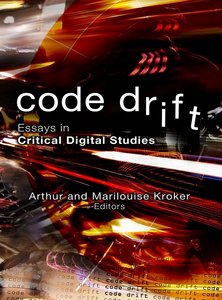Code DriftEssays in Critical Digital Studies
|

|
 Diese Seite wurde seit 1 Jahr inhaltlich nicht mehr aktualisiert.
Unter Umständen ist sie nicht mehr aktuell.
Diese Seite wurde seit 1 Jahr inhaltlich nicht mehr aktualisiert.
Unter Umständen ist sie nicht mehr aktuell.
 Zusammenfassungen
Zusammenfassungen
 From the preface:
From the preface:What is the fate of the regime of computation? A global
techno-culture inscribed by the terrorism of the code or an
emergent age of networked individualism driven onwards by the
ecstatic visions of augmented reality, mobility, and connectivity?
When the regime of computation suddenly slams into the
real world of globalization, when code is forced to tangle with the
always messy world of blown away referential values -- the real
world of gender trouble, stormy challenges to the big signifiers of
race, class and ethnicity -- we finally know that we are living in
the beginning days of something radically new, namely a culture
of code drift.
All the pure signs are present in code drift, from the
radiating positivity of the terrorism of the code to the
irrepressible creativity of augmented reality. How could they not
be? The formal structure of all programming language also
carries within itself traces of the modernist episteme with its
endless variations of the supposedly counter-languages of form
and syntax. So too, code drift is most certainly always framed by
the politics of the pure signs of these the most computational of
all times: pure cybernetic terrorism, pure mobile contingency. But
for all that, when the language of the code follows its fatal, but no
less inevitable, passage across the real world of globalization,
when form is deeply inflected with the syntax of the human, non-
human, and post-human, we are suddenly propelled into a new
era of indeterminate trajectories, unpredictable inflections,
strange complexities...
 Dieses Buch erwähnt ...
Dieses Buch erwähnt ...
 Personen KB IB clear | Jack Goldsmith , Daniel J. Solove , Tim Wu | |||||||||||||||||||||||||||
 Begriffe KB IB clear |  augmented reality augmented reality augmented reality
, augmented reality
,  CO2-Fussabdruck
, Code
, CO2-Fussabdruck
, Code
,  Kreativität Kreativität creativity
, creativity
,  Politik Politik politics
, politics
,  Programmieren Programmieren programming
, programming
,  Terrorismus Terrorismus terrorism
, World of Warcraft terrorism
, World of Warcraft
| |||||||||||||||||||||||||||
 Bücher |
|
 Zitationsgraph
Zitationsgraph
 Zitationsgraph (Beta-Test mit vis.js)
Zitationsgraph (Beta-Test mit vis.js)
 Volltext dieses Dokuments
Volltext dieses Dokuments
 Bibliographisches
Bibliographisches 
 Beat und dieses Buch
Beat und dieses Buch
Beat hat dieses Buch während seiner Zeit am Institut für Medien und Schule (IMS) ins Biblionetz aufgenommen. Beat besitzt kein physisches, aber ein digitales Exemplar. (das er aber aus Urheberrechtsgründen nicht einfach weitergeben darf). Es gibt bisher nur wenige Objekte im Biblionetz, die dieses Werk zitieren.











 , 5080 kByte)
, 5080 kByte) 



 Biblionetz-History
Biblionetz-History